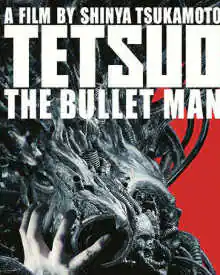X

Shinya Tsukamoto
Actor/Director
Biography:
Shinya Tsukamoto (Tsukamoto Shin'ya?) is a Japanese film director and actor with a considerable cult following both domestically and abroad. Biography: Tsukamoto started making movies at the age of 14, when his father gave him a Super 8 camera. He made a number of films, ranging from 10-minute shorts to 2-hour features, until his first year at college when he temporarily lost interest in making movies. Tsukamoto then started up a theatre group, which soon included Kei Fujiwara, Nobu Kanaoka, and Tomorowo Taguchi, all of whom would continue to work with Tsukamoto up through the filming of Tetsuo: The Iron Man. One of their theatre productions at this time was Denchu Kozo no boken. At the end of the production, Tsukamoto didn't want to waste all the effort they had put into building the set, so he decided to shoot a film version. Tsukamoto's early films, Futsu saizu no kaijin (A Phantom of Regular Size) and Denchu Kozo no boken (The Adventures Of Electric Rod Boy) made in 1986/87, were short subject science fiction films shot on colour 8 mm film. In both films he made aggressive use of jarring editing, stop-motion animation, bizarre sound effects, and grotesque or outlandish subject matter. Denchu Kozo concerned itself with an unhappy young boy with an electricity pylon growing out of his back, who is transported into the future and must do battle with cyborg vampires trying to destroy sunlight. His black & white 16 mm feature Tetsuo: The Iron Man, made in 1988 and shot in the same low-budget, underground film-production style as his previous films, established him internationally and created his worldwide cult. This extremely graphic but also strikingly-filmed fantasy deals with a guilt-consumed man whose body begins turning gradually into metal, and includes an iconic scene in which the protagonist's penis is revealed to have turned into an electric drill. The movie is an allegory about the destruction of nature by man. Tsukamoto has stated he has a love-hate relationship with Tokyo, and in the end the characters of this film set out to destroy it. Tetsuo is considered the definitive example of Japanese Cyberpunk. Tsukamoto's next film, Hiruko the Goblin, was a more conventional horror film, about demons being unleashed from the gates of hell. He then created a sequel to Tetsuo: The Iron Man, named Tetsuo II: Body Hammer, which revisited many of the same ideas as the first movie but with a bigger budget and shot in color on 35 mm film. In Body Hammer, a salaryman's son is kidnapped by a group of thugs, who then force the man's nascent rage to make him mutate into a gigantic human weapon. The film diverges from the original in a number of ways, not the least of which being that it tries to supply understandable motives for everyone involved. Many critics cited this as a weakness, since the nightmarish, transiently surreal feel of the first film, aided by accident or design by a lack of effort at coherence, proved one of its strongest assets. Tokyo Fist (1995) again dealt with the idea of rage as a transformative force (similar to David Cronenberg's The Brood). Here, a meek insurance salesman discovers that an old friend of his, now a semi-professional boxer, may be having an affair with his fiancée. The salesman then enters into a rigorous and self-destructive boxing training program to get even. Here, Tsukamoto showed he was not simply interested in wild, outlandish fantasy, but in blunt realism as well. However, he does not completely abandon the fantasy that has become his trademark - unnatural amounts of blood are depicted as issuing from the actors. Bullet Ballet (1998) drifted even further from fantasy and science fiction, and more into a sort of film noir territory. A man (played by Tsukamoto) discovers that his longtime girlfriend committed suicide with a gun, and becomes obsessed with getting a gun just like that one. His single minded behavior causes him to run afoul of a gang of thugs, especially when he shows interest in the young girl who is one of their compatriots. Many critics complained the second half of the film lost the direction and momentum of the first half, but it was clear that Tsukamoto was trying to take more risks with his ideas than before. Gemini (1999) was a lush and disturbing adaptation of an Edogawa Rampo story, in which a country doctor with pretensions of superiority has his life torn apart when another man who appears to be his exact duplicate enters his life. Things are complicated further by the twin taking control of his wife, an amnesiac with a criminal background. Many hailed it as being Tsukamoto's best film ever and it certainly compares favorably to Tetsuo in terms of both story, visuals and execution. A Snake of June (2002) once again found Tsukamoto employing the formula of two men in competition for one woman, as a young lady is blackmailed into perverse sexual behavior against her husband's will -- until her husband finds that he enjoys the blackmail more than the blackmailer does. Vital (2004) continues Tsukamoto's move towards a more organic theme in his work, again featuring a love triangle, this time consisting of two women and one man. The story concerns a young man whose girlfriend is killed in a car crash whilst being driven by him. He is a medical student and is given her body to dissect in class (whether by coincidence or intentionally is not clear). Tsukamoto also acted in and directed the short film Haze in 2005. In 2006, Tsukamoto directed the horror thriller Nightmare Detective (Akumu Tantei). The film centres around a vagrant with the supernatural ability to enter the dreams of others and a police officer who pleads with him to help her solve a series of bizarre murders committed by a serial killer with a similar ability, played by Tsukamoto himself. While Nightmare Detective is in some ways an un-Tsukamoto film, Tsukamoto has stated that he is satisfied with the movie, and travelled to South Korea to promote the film. Recently it was announced that there is going to be a sequel to the film, with Tsukamoto wanting to make it into a trilogy. It's worth noting that Tsukamoto acts in nearly all of his films, with the exception of those that he worked on as a 'director for hire' (namely Hiruko the Goblin and Gemini). Tsukamoto has appeared in many other directors' films as well, such as Takashi Miike's Dead or Alive 2: Birds (2000), and Ichi the Killer (2001), as well as Teruo Ishii's Blind Beast Vs the Dwarf (2002). He was the lead actor in Takashi Shimizu's Marebito (2004), and appeared more recently in Welcome to the Quiet Room (2007). He is also a successful voiceover artist for TV advertising in Japan. He also provided the Japanese voice of Vamp in the 2008 PlayStation 3 game Metal Gear Solid 4: Guns of the Patriots (a character previously voiced by Ryōtarō Okiayu in Metal Gear Solid 2: Sons of Liberty).
Read More
Shinya Tsukamoto Movies
| Movie | Director | |
|---|---|---|
|
|
Shinya Tsukamoto | 21 Jan 2011 |
Shinya Tsukamoto: Age, Net Worth, Movies, Family, and Personal Details
Shinya Tsukamoto |
|
| Name | Shinya Tsukamoto |
| Profession(s) |
Main Profession Other Profession |
| Date Of Birth | 01 Jan 1960 |
| Age | 64 |
| Birth Place | |
| Current Residence | |
| Religion | |
| Nationality | |
| Height | |
| Zodiac Sign | |
| Hobbies | |
Shinya Tsukamoto Net Worth |
|
| Net Worth | |
Frequently Asked Questions (FAQs) About Shinya Tsukamoto
-
What is Shinya Tsukamoto's age?
The age of Shinya Tsukamoto in the 2024 was 64.
-
What is the Shinya Tsukamoto date of birth?
The DOB for Shinya Tsukamoto was 01 Jan 1960.
-
What is Shinya Tsukamoto's latest movie?
The most recent movies for Shinya Tsukamoto is Tetsuo: The Bullet Man.
Shinya Tsukamoto News
-
 'Inside Out 2' Early Reactions Hint At Another Pixar Masterpiece, Fans Excited
'Inside Out 2' Early Reactions Hint At Another Pixar Masterpiece, Fans Excited -
 Kung Fu Panda 4 OTT Release Date & Platform Fixed: When & Where To Wat..
Kung Fu Panda 4 OTT Release Date & Platform Fixed: When & Where To Wat.. -
 Deadpool & Wolverine Cast Fees: Ryan Reynolds Salary Is 150% HIGHER Than H..
Deadpool & Wolverine Cast Fees: Ryan Reynolds Salary Is 150% HIGHER Than H.. -
 MET Gala 2024: WHO Will Host The Exclusive Fashion Event THIS Year?
MET Gala 2024: WHO Will Host The Exclusive Fashion Event THIS Year? -
 XG Captivates Global Audience With New 'XG TAPE #4' Featuring HARVEY
XG Captivates Global Audience With New 'XG TAPE #4' Featuring HARVEY -
 Atlas OTT Release Date Platform: Netflix Releases Power-packed Trailer Of Jenn..
Atlas OTT Release Date Platform: Netflix Releases Power-packed Trailer Of Jenn..
Celeb Birthdays
-
Rashmi Gautam Apr 27
-
Sally Hawkins Apr 27
-
Jessica Alba Apr 28
-
Sharman Joshi Apr 28
-
Nikkhil Advani Apr 28
-
Penelope Cruz Apr 28
-
Priyanka Deshpande Apr 28
Celebs In Spotlight
Enable




 Click it and Unblock the Notifications
Click it and Unblock the Notifications


















